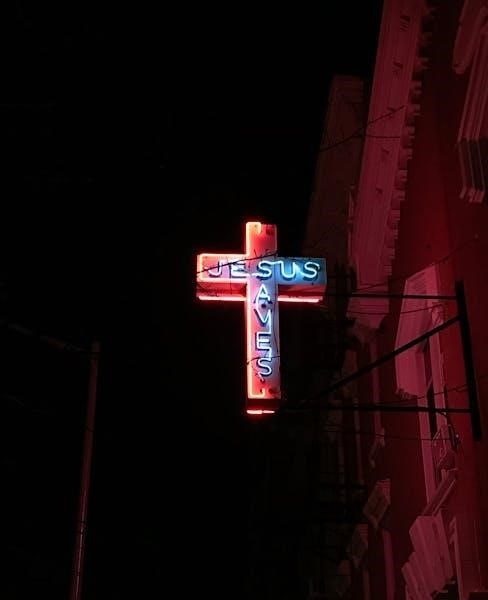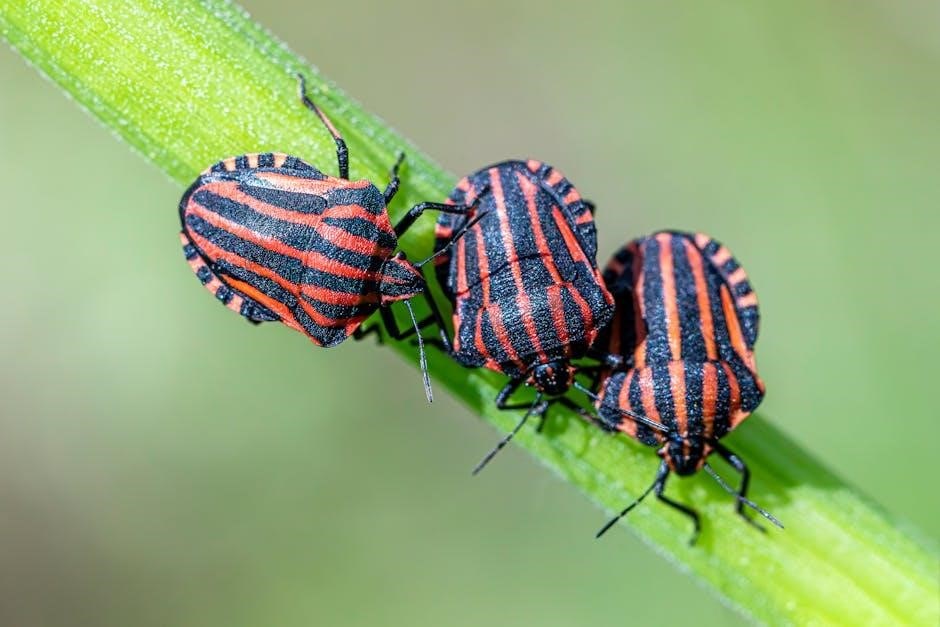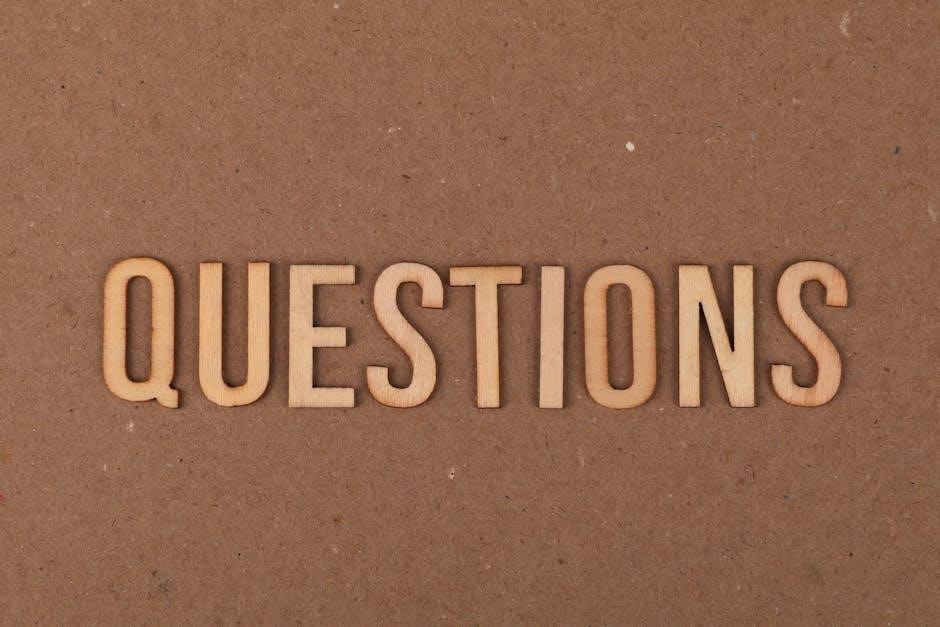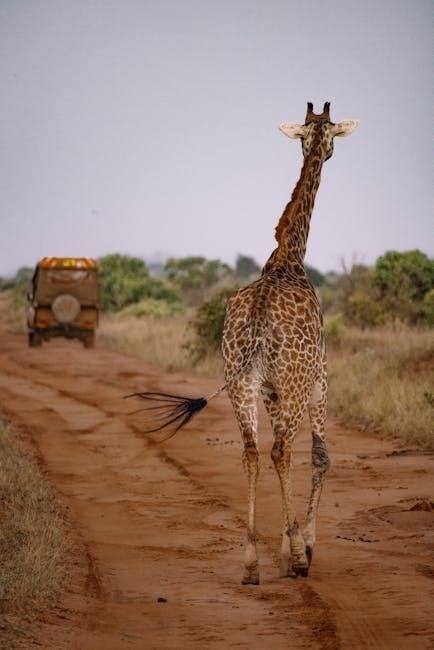
lord of the flies chapter 4 questions and answers pdf
Chapter 4 explores the boys’ struggle with civility and power dynamics. The conch becomes a symbol of order, while the island’s setting influences their behavior and decisions.
Overview of Key Themes and Events
In Chapter 4, themes of power, civility, and savagery emerge as the boys face challenges. The conch shell symbolizes order, while Jack’s desire for leadership intensifies. Daily life on the island reveals struggles with cooperation and responsibility. The assembly highlights the importance of rules, yet tensions rise as Ralph and Jack clash. Jack’s use of face paint marks a turning point, reflecting his embrace of primal instincts. These events foreshadow the decline of civilization and the rise of chaos among the group.

The Significance of the Conch in Chapter 4
The conch shell serves as a symbol of democracy and order, allowing boys to speak during assemblies. Its influence wanes as savagery rises, reflecting the group’s moral decay.
Questions and Answers About the Conch’s Role
Q: What is the conch’s role?
A: It symbolizes order and democracy, giving speaking rights. Q: Why does its power fade?
A: As the boys embrace savagery, the conch’s authority diminishes, highlighting their moral decline. Q: Who uses it last?
A: Ralph, signifying his failed attempt to restore civility. The conch’s destruction later mirrors the collapse of their civilization.

Leadership and Power Struggles in Chapter 4
Ralph and Jack’s conflict escalates, revealing their differing priorities. Ralph focuses on shelter and fire, while Jack craves hunting power, symbolizing civility versus savagery.
Why Does Jack Feel He Should Be Elected Chief?
Jack believes he should be chief because of his hunting success, which he sees as essential for the group’s survival. He argues that his ability to provide meat makes him a better leader than Ralph, who focuses on building shelters and maintaining the signal fire. Jack’s confidence in his hunting prowess and his desire for power drive his conviction that he is the most suitable leader. His reasoning appeals to the boys’ primal needs, emphasizing strength and provision over civility and order.
Who Becomes the First Leader and Why?
Ralph becomes the first leader of the boys on the island. He is chosen because he discovered and used the conch shell, which symbolizes authority and order. The boys are drawn to Ralph’s fairness and organizational skills, qualities that suggest he can maintain civility and ensure their survival. Additionally, Ralph’s focus on building shelters and keeping a signal fire aligns with the group’s initial needs and desire to be rescued. His leadership represents a commitment to teamwork and the preservation of their civilized nature.
Rules and Governance on the Island
The boys establish rules to maintain order; Key rules include the conch shell for speaking and keeping the fire lit for rescue. These rules symbolize their attempt to preserve civilization and unity, ensuring everyone’s safety and cooperation. Over time, adherence to these rules becomes a measure of their commitment to maintaining a structured society amidst the island’s challenges.
Two Rules Created in the Assembly
The assembly establishes two key rules to maintain order: first, the conch shell determines speaking rights, ensuring fairness in discussions. Second, keeping the fire lit signals their presence for potential rescue. These rules aim to preserve civilization and cooperation, emphasizing the importance of collective effort for survival. The conch symbolizes democracy, while the fire represents hope and responsibility. Together, they reflect the boys’ attempt to create structure and maintain unity in their isolated environment.
The Importance of Rules for Civilization
Rules are essential for maintaining order and civility among the boys on the island. They provide structure and prevent chaos, ensuring collective survival. The conch shell and fire rules symbolize democracy and responsibility, binding the group together. Without rules, the boys might descend into anarchy, losing their connection to civilized society. These rules reflect their attempt to uphold moral standards and cooperation, highlighting the importance of governance in sustaining human decency and societal norms. Rules act as a barrier against savagery, preserving their humanity in isolation.

The Hunters and Their Actions in Chapter 4
The hunters, led by Jack, focus on killing pigs, using face paint for camouflage. Their actions reveal a shift toward savagery, alarming Ralph and others.
Jack’s Use of Face Paint and Its Impact
Jack’s use of face paint in Chapter 4 symbolizes his embrace of savagery. The paint serves as camouflage for hunting but also transforms him, enhancing his primal instincts. It intimidates others, showcasing his power and dominance. This act highlights Jack’s growing detachment from civilization and his desire to lead through fear. The face paint becomes a visual representation of his inner transformation, reflecting the group’s gradual descent into chaos and the blurring of moral boundaries.
Ralph’s Reaction to the Hunters’ Behavior
Ralph is disheartened by the hunters’ behavior, particularly their reckless celebration of the pig kill. He criticizes Jack for neglecting the fire, emphasizing the importance of rescue over hunting. Ralph’s frustration grows as he realizes the group’s priorities are shifting. His leadership is challenged as the hunters’ antics reflect a growing disregard for rules and civility. Ralph’s reaction underscores his commitment to maintaining order and the strain it places on his leadership, highlighting the conflict between responsibility and primal instincts.

The Setting and Atmosphere at the Beginning of Chapter 4
The chapter opens with the sun high, creating a midday atmosphere. The setting reflects the boys’ struggle to maintain civility, as the absence of adult supervision intensifies primal instincts.
Daily Life on the Island
Daily life in Chapter 4 reflects a mix of chaos and fragile order. The boys struggle to maintain the signal fire, while hunting and gathering become priorities. Power dynamics emerge as responsibilities are delegated. The conch shell remains a symbol of authority, guiding meetings. Littluns spend their days playing on the beach, unaware of growing tensions. The absence of adult supervision accelerates the erosion of civility, revealing the boys’ primal instincts and the challenges of sustaining order in isolation.
The Impact of the Setting on the Boys’ Behavior
The island’s isolated, primal environment significantly influences the boys’ actions. The absence of adult supervision and civilized norms fosters a gradual descent into savagery. The dense jungle and unpredictable wildlife create fear, while the need for survival drives competitiveness. The setting’s beauty contrasts with its dangers, heightening tensions. As resources become scarce, the boys’ behavior grows more aggressive, mirroring the island’s untamed nature. This environment accelerates the breakdown of their moral boundaries, revealing their true human instincts.

Conflict and Tensions Between Ralph and Jack
Ralph and Jack’s power struggle intensifies, fueled by differing priorities and clashing personalities. Their disagreements over leadership and responsibility escalate tensions, reflecting the group’s growing savagery.
How Ralph Criticizes Jack’s Actions
Ralph criticizes Jack for neglecting the fire, emphasizing its importance for rescue. He accuses Jack of prioritizing hunting over responsibilities, revealing frustration with Jack’s lack of accountability. Ralph’s criticism highlights the growing tension between them, as Jack’s obsession with power and control clashes with Ralph’s focus on survival and order. This conflict underscores their differing values and leadership styles, escalating the power struggle on the island.
Jack’s Response to Ralph’s Accusations
Jack reacts defensively, dismissing Ralph’s concerns and justifying his actions. He argues that hunting is essential for their survival, shifting blame and asserting his dominance. Jack’s response reflects his growing resentment towards Ralph’s leadership and his own desire for power. He becomes increasingly aggressive, showing a willingness to challenge Ralph openly. This confrontation deepens the rift between them, highlighting Jack’s prioritization of savagery over civility and setting the stage for further conflict.
Simon’s Role and Insights in Chapter 4
Simon represents innocence and moral insight, questioning the existence of the beast. His thoughts are often overlooked, isolating him despite his deep understanding of the group’s dynamics.
What Does Simon Represent in the Novel?
Simon represents innocence, morality, and the natural goodness of humanity. His quiet, introspective nature and ability to see beyond superficial concerns highlight his deep understanding of the group’s dynamics. He embodies a connection to truth and intuition, often expressing insights that others overlook. Simon’s isolation and eventual tragic fate symbolize the destruction of innocence and reason in the face of fear, savagery, and power struggles. His character serves as a moral compass, contrasting sharply with the descending chaos on the island.
Simon’s Questions and Revelations
Simon’s questions often challenge the boys’ assumptions, revealing his deep understanding of their situation. He questions the existence of the beast, suggesting it may be a product of their own fears. Simon’s revelations, such as his realization that the beast is a manifestation of their inner savagery, highlight his wisdom and intuition. His insights, however, are often ignored, underscoring the group’s resistance to truth. Simon’s ability to see beyond the surface demonstrates his unique perspective and moral clarity, setting him apart from the others. His thoughts foreshadow his tragic fate.

The Boys’ Rescue and Survival
The boys’ rescue is not addressed in Chapter 4, as the focus remains on their survival efforts and internal conflicts. Ralph’s leadership is emphasized.
Do the Boys Get Rescued from the Island?
In Chapter 4, the boys are not rescued from the island. Their focus remains on survival and maintaining the signal fire, a crucial tool for potential rescue. However, no external aid arrives, and the boys’ energy shifts toward internal power struggles and primitive instincts. The lack of rescue highlights their isolation and the growing chaos among them.
Why Is Ralph Chosen as the Chief?
Ralph is chosen as the chief because he discovered the conch, a symbol of power and order. The boys see him as fair and responsible, trusting his leadership to maintain civilization. His ability to call assemblies and ensure everyone’s voice is heard through the conch earns their respect. Ralph’s calm demeanor and focus on building shelters and maintaining the signal fire further solidify his position as the rightful leader; His leadership represents hope for survival and order on the island.
Related Posts

five rites of rejuvenation pdf
Discover the ancient Tibetan secrets to a younger, healthier you! Download the ‘5 Rites of Rejuvenation’ PDF and start your journey to incredible energy & well-being today. ✨

the clean house by sarah ruhl pdf
Download Sarah Ruhl’s ‘The Clean House’ in PDF format! Explore this Pulitzer Prize finalist – a quirky, funny, and deeply moving play about love, loss, and cleaning. Get your copy now!

fifty shades of grey book free pdf
Dive back into the passionate world of Christian Grey! Download the *Fifty Shades Freed* PDF now and experience the thrilling conclusion. Free & easy access!